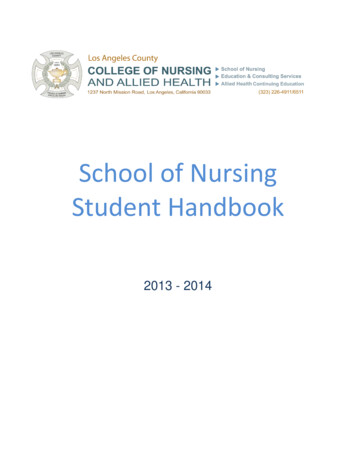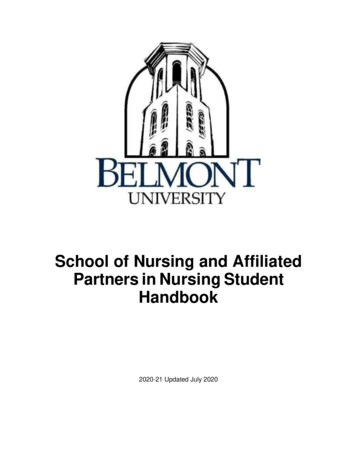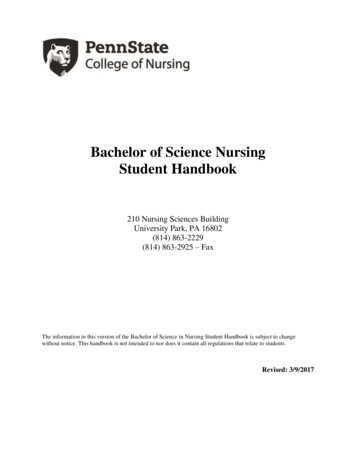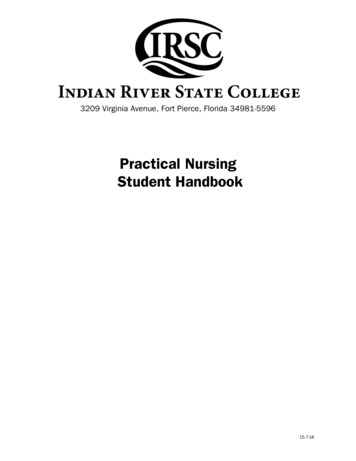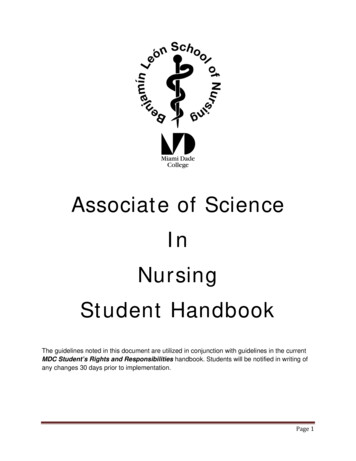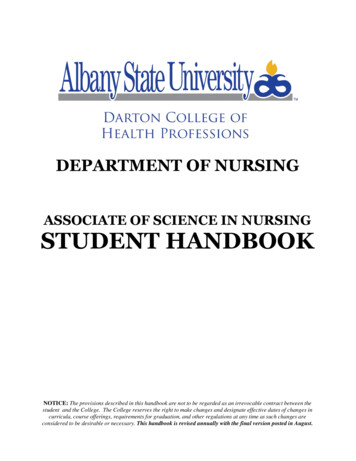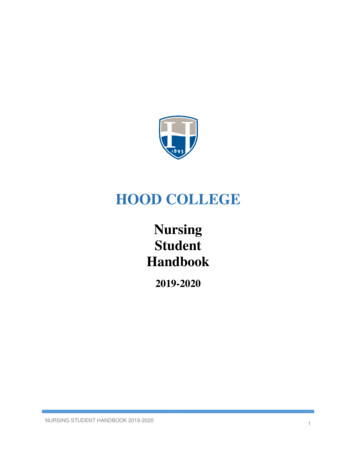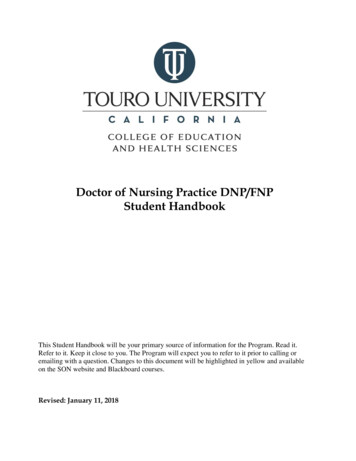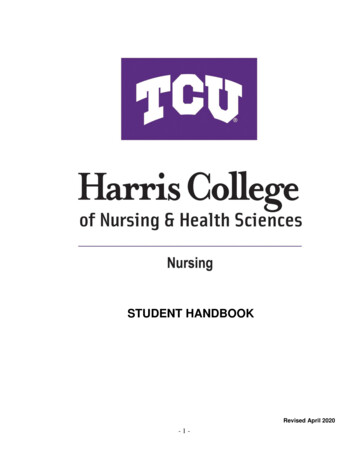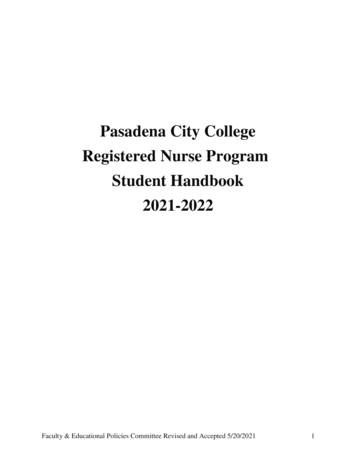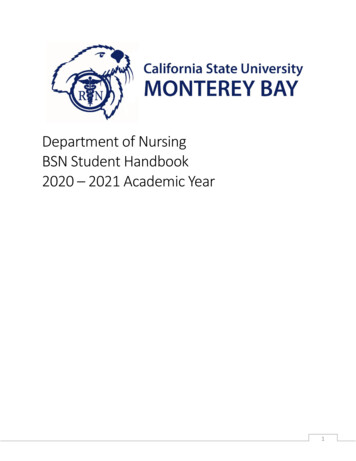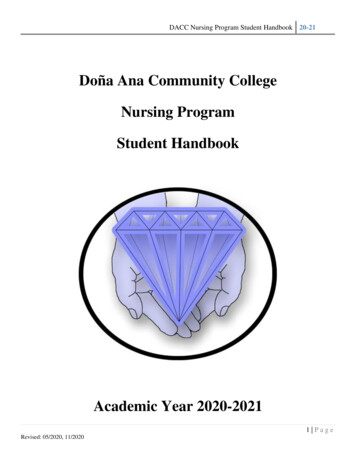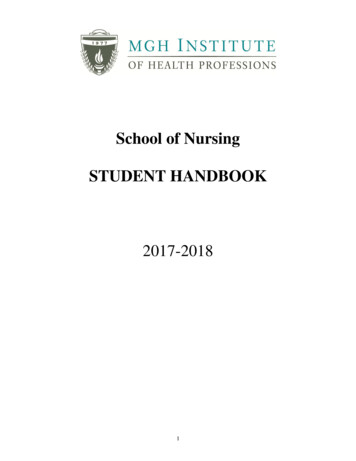
Transcription
School of NursingSTUDENT HANDBOOK2017-20181
CONTENTABOUT THE SCHOOL OF NURSINGProgram SummariesTerminal Objectives by ProgramSON Administrative CT ENTRY MASTER’S STUDENTSAdmission RequirementsAdmission ProcessBACCALAUREATE STUDENTSAdmission Requirements and Process for Baccalaureate StudentsREGISTERED NURSE STUDENTSAdmission Requirements and Process for RN Students with a Baccalaureate DegreeAdmission Requirements and Process for RN Students without a Baccalaureate DegreeCERTIFICATE OF ADVANCED STUDIES (CAS)Admissions Requirements and Process for CAS Course of StudyDOCTOR OF NURSING PRACTICE STUDENTSAdmission Requirements and Process for Doctoral Course of StudyREGISTRATIONTechnical StandardsStudents Unable to Meet the Requirements/SkillsHEALTH AND SAFETY REQUIREMENTSCLINICAL EDUCATION REQUIREMENTSAnnual Required TrainingHIPPAA/OSHA (Infection Control) RequirementsExpensesTravelContacting Clinical FacilitiesLicensure as a Registered NurseCriminal Background Check Requirement2
Advanced Placement for Students Entering the MS Program as Registered NursesCourse Placement PoliciesRegistered Nurses with a Baccalaureate Degree in NursingPost-Master’s DNP StudentsNeedle Stick ProcedurePROFESSIONALISMProfessional AttireCode of Professional Behavior for StudentsHarassmentViolence and/or Threats of ViolenceIntimidationIntegritySocial and Professional EtiquetteBehavior on Social Networking SitesDuty to ReportPROGRESSIONPre-registrationContinuous EnrollmentLeave of AbsenceCourse ProgressionPart-time Status for Direct-Entry Master’s and Baccalaureate StudentsNCLEX-RNGradingGrading ScalePass/Fail optionIncomplete workResolution of student faculty conflicts regarding gradingFeedback in Clinical CoursesAcademic StandingDefinitionsProgressions StandardsAutomatic Review ProcessAppeal Procedure Requests for ReviewAlternative Methods to Complete Degree RequirementsTransfer CreditsCredit by ExaminationCourse ExemptionsIndependent StudyAdding and Dropping CoursesWithdrawal PolicyAttendance Requirements3
Auditing CoursesChanging SpecializationGRADUATIONTime for Completing ProgramCourse RequirementsParticipation in Graduation CeremonyCURRICULUMCourse Requirements and OptionsCurriculum PlansScholarly Project for MS ProgramIndependent StudyFormat for Written WorkCourse Credit / Contact Hour RatioTheory Credit RatioClinical Credit RatioLab Credit RatioPractice Credit RatioPrivacy Rights ClauseSCHOOL OF NURSING GOVERNANCECurriculum CommitteePolicy CommitteeEvaluation CommitteeJudicial BoardEVALUATIONCourse and Faculty EvaluationAPPENDICESA.B.C.D.E.Notification of Change of Academic AdvisorConsent Form for Physical ExaminationConsent Form for Participation in Learning ActivitiesSchool of Nursing Honor CodeIncident Report4
School of Nursing Administrative StructureDr. Inez Tuck serves as the Dean of the School of Nursing. She is responsible for the overall direction andmanagement of the School. Working with the faculty, Dr. Tuck is responsible for the content, scope, andquality of the curriculum, academic standards, and the degree requirements of the programs, includingboth clinical and academic components. She hires, evaluates, and supports the development of faculty inteaching, scholarship/research and service. As a member of the Institute’s senior administrative team, sheworks closely with the Provost and Vice-President of Academic Affairs on the development andadministration of the academic programs in the School of Nursing and in coordination with the otheracademic programs of the Institute. Additionally, she provides leadership in professional and academicareas through active involvement in external educational and professional organizations, representing theInstitute in these endeavors.Dr. Leslie Neal-Boylan serves as the Associate Dean for Academic Affairs and Program Innovation. Shehas broad responsibility for providing leadership in curriculum development, evaluation, and revision forall programs; for providing leadership in evaluation of all aspects of the SON; and in mentoring faculty inteaching, scholarship, and research.Dr. Lussier-Duynstee serves as the Assistant Dean for Student Support and Clinical Facilitation. She hasleadership and administrative responsibilities for: student recruitment, admissions, and retention, throughpurposeful student engagement, advocacy and advisement; oversight of academic support services andinterface with faculty on student academic issues.The Graduate Programs are led by Dr. Margaret Sipe, Director of the Doctor of Nursing Practice Programand Dr. Patricia Reidy, Director of the Advanced Practice Level of the Master’s of Science in NursingProgram. Dr. Suellen Breakey is the Director of the Pre-licensure Programs at the Accelerated Bachelorof Science in Nursing and Generalist Level of the Direct-Entry Master’s of Science in Nursing Program.The Directors report to the Dean of the School of Nursing and are members of the Executive LeadershipCouncil in the School of Nursing.The Assistant Dean and Directors are responsible to the Dean for faculty team development, oversight forcurriculum at their level of study, student and faculty liaison, faculty orientation and development,development and revision of nursing program policies and implementation of curricula, and resourceprojection and management for their respective programs.The Clinical Education Department, consisting of Ms. Katherine Socha, Ms. Claire Sonnenberg, and Ms.Linda Henry develops contacts with a wide variety of clinical venues that serve as sites for studentlearning at both prelicensure and advanced practice levels to appropriately match students and clinicalsites.Specialization Coordinators are faculty with expertise and certification in a specific advanced practicespecialty. These faculty monitor certification requirements for the specialization and provide guidance oncurriculum and content issues appropriate to the specialization. The Specialization Coordinators are: Dr.Joshua Dion (Adult Gerontology Acute Care NP); Dr. Amy Bruno, Antonia Makosky, and Kathryn Hall(Adult Gerontology Primary Care NP); Dr. Clara Gona and Mr. Jason Lucey (Family Specialty NP); Dr.Mary Thompson (Pediatric Specialty NP); Dr. Susan Stevens (Psychiatric/Mental Health-Lifespan NP);Ms. Katherine Simmonds (Women’s Health NP and Dual Adult Gerontology/Women’s Health NP).5
School of NursingFull-time FacultyNancy Baker, PhD, RN ANP-BCAssistant ProfessorAbraham Ndiwane, EdD, RN, CHESAssociate ProfessorSuellen Breakey, PhD, RNAssistant ProfessorDirector, Pre-Licensure/Generalist ProgramsLeslie Neal-Boylan, PhD, RN,CRRN, APRN, FAANProfessorAssociate Dean of Academic Affairsand Program InnovationAmy Bruno, PhD, RN, ANP-BCAssistant ProfessorPatrice Kenneally Nicholas, DNSc,MPH, RN, ANP-C, FAANProfessorInge Coreless, PhD, RN, FAANProfessorRita Olans, DNP, RN, CPNP, SNPBCAssistant ProfessorMary Beth Coughlin, RN, CPNPInstructorAndrew Phillips, PhD, RNAssistant ProfessorAmy Fuller, DNP, RN, WHNP-BCInstructorMechelle Plasse, PhD, RN, PMHNPBCAssistant ProfessorClara Gona, PhD, RN, FNP-BCAssistant ProfessorEleonor Pusey-Reid, DNP, Med, RN,CCRNAssistant ProfessorJanice Goodman, PhD, RN, PMHCNS-BCProfessorLisa Quinn, PhD, RN, OCNAssistant ProfessorKristina Green, DNP, RN, FNP-BCAssistant ProfessorPatricia Reidy, DNP, RN, FNP-BCAssociate ProfessorDirector, Advanced PracticeProgramsPatricia Grobecker, DNP, RN-BCInstructorRaquel Reynolds, PhD, RN, MSN,PHCNS-BCAssistant ProfessorRebecca Hill, DNP, RN, FNP-CAssistant ProfessorKaveri Roy, DNP, RNAssistant Professor6
J. Alexander Hoyt, PhD, RNAssistant ProfessorKristine Ruggiero, PhD, RN, PNPBCAssistant ProfessorSusan Jussaume, MS, RN, FNP-BC, AHN-BCInstructorMeredith Scannell, PhD(c), MSN,MPH, CNM, SANEInstructorDebra Kelly, MS, RNAssistant ProfessorKatherine Simmonds, MS, MPH, RN,WHNP-BCAssistant ProfessorElissa Ladd, PhD, RN, FNP-BCAssociate ProfessorMargaret Sipe, DNP, RNAssistant ProfessorDirector, DNP ProgramRuth Palan Lopez, PhD, RN, GNP-BC, FAANProfessorSusan P. Stevens, DNP, MEd, RN,PMHNP-BCInstructorJason Lucey, MSN, RN, FNP-BCAssistant ProfessorCasey Sweeney, PhD, RN, FNP-BCAssistant ProfessorPatricia Lussier-Duynstee, PhD, RNAssistant ProfessorAssistant Dean, Student Support and Clinical FacilitationNancy Terres, PhD, RNAssociate ProfessorCarine Luxama, RN, MSN, ANP-BC, PMHNP-BCInstructorMary Thompson, PhD, RN, PNP-BCAssistant ProfessorAntonia Makosky, DNP, MPH, RN, ANP-BCAssistant ProfessorInez Tuck, PhD, RN, MBA, MDivProfessorDeanTalli McCormick, MSN, RN, GNP, APRN-BCAssistant ProfessorLisa Wood, PhD, RN, FAANProfessorPeabody Chair in Nursing ResearchPart-time FacultyKathryn Atkin DNP, ANP-BC, WHNP-BCAssistant ProfessorKathryn Sabo, MS, RN-BCInstructorJean Bernhardt, PhD, RN, NHA, NEA-BC, FNP-BCAssistant ProfessorEmily Karwacki Sheff, MS, CMSRN,FNP-BCInstructor7
Joshua Dion, DNP, RN, ACNP-BCClinical Assistant ProfessorSara Smoller, MS, RN. ANP-BC,CCDInstructorKathryn Hall, MS, RNCS, ANP-BCAssistant ProfessorSheila Swales, MS, RN, PMHNP-BCInstructorMaureen J. Marre, MSN, RN, FNP-BCInstructorJohn Wong, PhDInstructorMertie Potter, DNP, RN, PMHNP-BCInstructorTrisha A. Zeytoonjian, MS, RNInstructorFaculty EmeritiLinda Andrist, PhD, RNC, WHNP-BCProfessor EmeritaAlexandra Paul-Simon, PhD, RNProfessor EmeritaArlene Lowenstein, PhD, RNProfessor EmeritaJean E. Steel, PhD, RN, FAANProfessor EmeritaDiane Mahoney, PhD, ANP-BC, FGSA, FAANProfessor EmeritaBarbara K. Wilson, PhD, RN, CSAssistant Professor EmeritaYvonne L. Munn, MS, RNProfessor EmeritaMargery Chisholm, EdD, RN, CS,ABPPProfessor and Dean Emerita8
ADVISEMENTEach student is assigned an academic advisor prior to initial orientation to the program.At matriculation, each student meets with the assigned faculty advisor and reviews the course of study,which is available to both student and advisor in IONLINE. This program of study serves as a guide toacademic progress.A. Role of Academic Advisor1. Maintains a schedule of office hours for a minimum of two (2) hours a week each semester2. Contacts each advisee the first week of the student’s program3. Meets with each advisee when applicable, at a minimum of once a year and/or duringadvisement period To review current academic status To review course of study and advise for registration To clear student in IONLINE in order to register4. Reviews advisee’s progress each semester5. Reviews advisee's program of study for completion of all credits/requirements forgraduation6. Completes course add/drop form7. Advises when an academic warning has been issued8. Plans for graduation9. Counsels students if considering change in status.10. Communicates change in student status to the Director of their program.11. Meets with student as requested.B. Role of the Student1. Responds to advisor’s communications2. Initiates an appointment with advisor as needed3. Meets with the advisor prior to registration4. Communicates with advisor prior to changes in program of study, track, or status.C. Change of AdvisorA change of academic advisor may be made upon request of either the faculty or student. Grantingthe request may be dependent upon faculty availability. The student is required to complete aNotification of Change of Academic Advisor Form. (Appendix A)[Policy reviewed Sept. 2017]D. Faculty SchedulesAll faculty will have schedules on file in the Dean’s office each semester and are expected to offeroffice hours for a minimum of two (2) hours a week each semester.REGISTRATIONThe following requirements pertain to all nursing students prior to course registration. The requirementsinclude skills and abilities, compliance with immunization requirements and proof of CPR certification.9
A.Technical StandardsNursing education requires the completion of a professional program that is both intellectually andphysically challenging. Students must be able to take part fully in the academic and clinical life of theprogram to benefit from the educational activities, and to succeed in fulfilling requirements for a degreeor certificate.In accordance with the provisions and philosophy of the Americans with Disabilities Act (ADA), facultyare committed to providing appropriate learning experiences that maximize every student’s potential, andworking with students with disabilities to determine if there are ways to assist them in performingessential requirements and skills to meet educational standards. All students will be held to the samestandards and must be able to meet the essential requirements and perform essential skills of theirpositions with or without reasonable accommodations.Technical standards refer to those physical, cognitive and behavioral abilities required for satisfactorycompletion of all aspects of the curriculum as a student in the nursing program.The qualified student must possess the mental, physical, and emotional capacities essential to attaining thecompetencies required to function as a nurse. These abilities enable the student to perform tasks requiredto meet professional requirements and work demands of the practicing nurse.Candidates who possess any disability that would potentially interfere with the attainment of suchcompetencies are encouraged to contact the Manager of Student and Disability Services, or the Dean ofthe Nursing program, to discuss and identify possible accommodations.Observation: Candidates must have sufficient sensory capacity to observe in team-based learning andlecture settings, the laboratory, and the health care or community setting. Sensory abilities must beadequate to perform appropriate examination and assessments including functional vision and tactilesensation to observe, diagnose, and treat a patient's condition.Communication: Candidates must possess sufficient ability to communicate one-on-one and in small andlarge group settings. As a student, one must demonstrate effective and professional verbal and non-verbalcommunication in academic, community, educational, and health care settings, and be able to demonstrateproficiency in written and spoken English.Motor: Candidates must have the ability to participate in diagnostic and therapeutic maneuvers andprocedures. They must be able to negotiate patient care environments, and be able to move betweensettings such as the classroom, health care facility, educational, or community setting. Physical staminasufficient to complete a rigorous course of didactic and clinical study is required. Long periods of sitting,standing or moving are required in a variety of learning sites. Candidates must be able to coordinate bothgross and fine muscular movements, maintain equilibrium, and possess functional use of the senses oftouch and vision.Intellectual: Candidates must be able to measure, calculate reason, analyze, and integrate information aswell as be able to comprehend temporal and spatial relationships.Social: Candidates must exercise good judgment and be able to function effectively in the face of stress,taxing workloads, and the uncertainties inherent in clinical practice. They must be able to maintainmature, sensitive and effective professional relationships with faculty, staff, students,patients, family members, and other members of the health care and/or educational team. Compassion,10
integrity, concern for others, interpersonal skills, interest, and motivation are all qualities that will beassessed during the admissions process and throughout the student’s nursing education.The following requirements are considered necessary for full participation: Students must be able to read, write, speak and understand English at a level consistent withsuccessful course completion and development of positive patient-nurse relationshipsStudents may attend classes 30 hours or more each week, including combinations of lecture,discussion, laboratory and clinical activitiesPreparation for class typically requires an additional 20-30 hours per week. The curriculum mayalso require scheduled classes or laboratory experiences at local facilities in the early morning,evening or weekendsStudents will participate in intellectual activities requiring critical thinking, judgment, analysis,arithmetic competency, and conceptualization of spatial relationships, problem solving andplanning within reasonable time frames within a complex environmentStudents will be required to participate in clinical and laboratory experiences that involveexposure to and palpation of patients’ and simulated patients’ body parts by faculty and studentsStudents must have verbal and non-verbal interpersonal and communication skills that areconsistent with productive classroom participation, respectful interactions with faculty, students,staff, patients, and development of appropriate therapeutic relationshipsStudents must possess the emotional health required for full use of their intellectual abilities, adaptation tounexpected change, exercise of good judgment, and safe completion of all responsibilities.Students Unable to Meet the Requirements / SkillsUpon request of persons unable to meet the above requirements, the MGH Institute of Health Professionswill provide reasonable accommodations that allow the individual to fulfill the essential requirements andskills within the program. However, the School of Nursing is unable to make accommodations thatimpose an undue burden, present a threat to the health or safety of the individual or others, orfundamentally alters the nature of the curriculum including didactic component, laboratory sessions andclinical experiences.[Policy updated Sept. 2017]HEALTH AND SAFETY REQUIREMENTSStudents must meet all health and safety requirements of the clinical education facility and of the Institute,prior to beginning any clinical education experience. Students must remain in compliance with allImmunization, CPR and Centralized Clinical Placement (CCP) requirements at all times. Failure to do somay result in a delay in clinical placement.Students are advised to also maintain their own copies of all immunization records, certifications, anddocumentation of physical exams and to make their available if asked by their preceptors and clinicalagencies.11
CLINICAL EDUCATION REQUIREMENTSPRECEPTORSA preceptor is an expert clinician with designated responsibility for clinical supervision of students in aparticular clinical area.Criteria for SelectionThe ideal preceptor is a master's prepared advanced practice nurse, a physician, or other primary carepractitioner, who meets the following criteria:1. Supports the philosophy and objectives of the Institute and the School of Nursing2. Demonstrates clinical competence and teaching ability, thereby serving as a student role model3. Demonstrates the ability to assess, plan, implement, and evaluate clinical care for a specific patientpopulation in a content area4. Establishes and maintains effective working relationships with colleagues and students5. Is willing to fulfill the responsibilities of a preceptor bya.b.c.d.e.reviewing the student's learning contractfacilitating the student's meeting the level objectives and goals in the learning contractsequencing learning experiences so that the student assumes increasing responsibilitysupervising/consulting with the student in the delivery of carefunctioning as a liaison to other colleagues to facilitate other experiences available at theclinical sitef. meeting periodically with student and faculty advisor to discuss and evaluate the student'sclinical experienceAnnual Required TrainingAll SON students across programs must complete the Massachusetts Centralized Clinical PlacementOnline Orientation between August 1st and August 31st annually regardless of whether they are in aclinical placement. Successful completion of this orientation will satisfy annual OSHA Compliance andHIPAA training requirements (See HIPAA/OSHA (Infection Control) Requirements)Training can be found at http://www.mass.edu/mc
The Graduate Programs are led by Dr. Margaret Sipe, Director of the Doctor of Nursing Practice Program and Dr. Patricia Reidy, Director of the Advanced Practice Level of the Master’s of Science in Nurs
